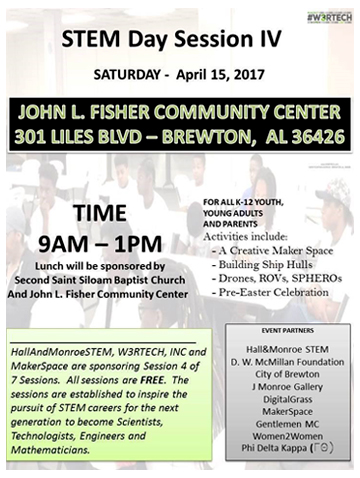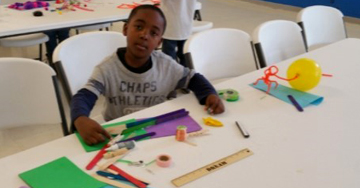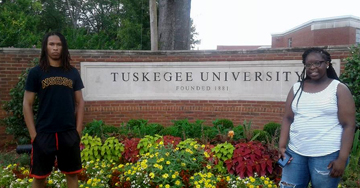Using a MakerSpace and STEM to Educate the Whole Person
by Marcus Hall | September 26, 2017
A native of Brewton, Alabama, Marcus Hall recently retired from the Space and Naval Warfare Systems Center Atlantic in New Orleans. He and his wife, Valerie Monroe-Hall, a social worker, are helping rural students in Brewton, AL gain access to STEM education by transforming a local community center into a learning hub.
Having grown up in the rural South, I have watched how educating the whole person has become less of a priority versus making the next super athlete or winning a state championship. The passion and culture surrounding high school football is unique; Friday night and Saturday high school football games are considered to be almost sacred events, drawing in fans from miles away. The emphasis placed on athletics (not scholastics) is the normal route for students to become recruited by universities and colleges.
Financial support for sports camps, sports traveling teams, and sports-related events is easily obtained from rural organizations. However, asking these same organizations to go beyond athletics and consider supporting new activities and resources, such as STEM and makerspaces, to educate the whole person is much more difficult.
After several failed attempts to recruit local organizations to consider supporting non-athletic opportunities to rural youth, my wife and I decided to invest our personal time and money into helping students gain access to STEM education. Our efforts have not been in vain as we have planted many seeds. Through a series of initiatives, our students are thriving, and so is our community!
It started with one of our students in New Orleans, Louisiana, came up with an eye-tracking apparatus with custom software that allows the disabled to draw using their eyes. This prototype won not only a State Science Fair but also an Infy Maker Youth Award, which measures a student on innovative use of technology to solve a real problem or need.
As part of the Youth award, Infosys Foundation USA included a grant of $5000 for a new community MakerSpace along with free tuition for Maker Education training for two adult leaders that would run the MakerSpace. Our student nominated both my wife and I as the recipients of the free training. We traveled to San Francisco for an intensive Maker Educator Training in August 2016 held by the Maker Ed organization, and funded by the Foundation.
Once back home in New Orleans, we took our newly-gained Maker Ed knowledge to transform two underutilized spaces, with the John L. Fisher Community Center in Brewton, Al being one of the two, into a new, cool place for all to learn. Materials and equipment were purchased with the Infy Maker Grant money. We outlined STEM activities and invited the community (K-12 students and families) to monthly events.

For the past nine months, we have seen an average of fifty-five youth and parents each month enjoy coming to the Center to design, build and test remote operated vehicles (ROVs), unmanned aerial vehicles (UAVs) and unmanned underwater vehicles (UUVs) made from everyday material. In addition, students and parents have learned basic binary coding, block coding, and basic art design. The attendance has remained constant with support coming from other organizations.
Students attending the Center's STEM sessions have enjoyed activities around programming robots, virtual reality, drones and rover maneuvers, and a creative maker space. These kids are being exposed to ideas and concepts that may hopefully inspire them to pursue STEM careers as scientists, technologists, engineers and mathematicians.

This new STEM Center in our rural area of Brewton, Al is providing a new outlook for students on future life opportunities. After one of the Center’s events, Ms. Margaret Bradley responded to our efforts. She is a former teacher, special education coordinator, assistant principal, principal, and community superintendent of schools at New York City Department of Education and currently lives in Brewton, Al after retirement. She said: "We need to encourage our youth to like and understand the possibilities in science and math that will be open to them in these much needed disciplines. Careers in science would guarantee jobs in the future. We have to change the mindset of our young people so they will embrace science which is a way of thinking. And, we have to encourage them to never stop asking questions. No question is stupid."

One such inquisitive student, Mia Boyd shared her views with us: "I thought engineering was only for boys. I have learned so much and I will do my best in science and math." Mia is one of several students awarded a sponsorship to attend Tuskegee University’s Minority Introduction to Engineering (MITE) summer program held July 9-15, 2017. Several students also received summer sponsorships to attend the National Flight Academy’s Six-day Summer Deployment Program at Naval Air Station Pensacola, Fl. through the D. W. McMillian Foundation.
We are delighted that this new Center is helping to educate the whole person.

